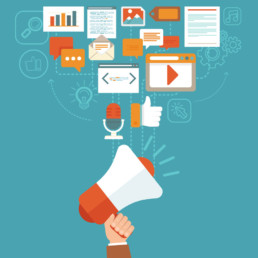What is a Content Marketing Funnel?
When you’re in business, it’s not enough look at the bottom line; you need to constantly think about ways to improve it. Growing your customer base or encouraging existing customers to take advantage of other products and services is the way to achieve your goal, and content marketing is a useful online tool to that end.
The focus of digital content marketing is to create and promote engaging content that drives awareness, enhances influence, and acquires customers. In other words, the content on your website should serve your business goal of attracting and retaining customers. To ensure that you’re on the right track, you’ll want to employ an approach called the content marketing funnel.
Content Marketing Funnel Definition
A content marketing funnel is an approach to online marketing that requires you to create different types of content for customers who are at different stages of the consumer lifecycle. It allows you to track brand familiarity and uses specially designed content to interest and convert shoppers into customers and to retain them.
You can picture the image in your mind: a funnel is wide at the top and narrows to allow you to easily pour liquid into a container. The various parts of the funnel are symbolic of customers at various stages of their buying lifecycle.

You can divide the funnel into three parts that reflect these stages:
- TOFU. TOFU stands for Top of Funnel, the funnel at its widest point. It represents the consumer awareness stage where potential customers are simply looking around for merchandise or services without having settled on a specific brand.
- MOFU. MOFU is the acronym for Middle of Funnel, the area where it tapers toward the spigot. It refers to the consideration stage of the lifecycle. Consumers are aware of your brand and exploring it in a bit more detail.
- BOFU. BOFU refers to Bottom of Funnel, the spigot where it narrows to allow for streaming into a container. It is the term for the purchase or trust stage, the point at which you aim to convert consumers to your brand.
Although there is no commonly accepted acronym for the next stage, let us suggest BEFU, or Beyond the Funnel. Visualize the container into which the funnel empties as representing customer retention; this, too, is an important part of the consumer lifecycle.
Matching Digital Content to Stages
So, you can identify the stages of the consumer lifecycle, but how do you relate them to content marketing?
As you’ve undoubtedly realized, you’ll need different online content for consumers at each stage of the lifecycle. After all, a customer who is just noticing your brand for the first time doesn’t want you hovering around, offering to answer any questions they have; they just want to explore.
By contrast, a customer who has educated him- or herself about your brand will be happy to have you available to answer additional questions about your product or service.
Your goal is to provide customers at each stage of the funnel with the content they need to lead them toward a purchase. Remember, great content also helps to keep customers interested in your business.
QUICK TIP
All of your online content should be written with a goal in mind and be appropriate for the stage of the consumer lifecycle it targets.
Content Marketing Examples
Let’s take a look at the types of content marketing you should consider for each part of the funnel – and beyond.

TOFU.
At the awareness stage of the lifecycle, your prospect has shown interest by arriving at your website, so you want to further their interest and generate brand awareness with interesting or educational content.
The key is to create copy that catches their attention and keeps them moving through the funnel, whether by discussing a problem that your business solves, reflecting on best practices or outlining common mistakes to avoid.
Content Marketing examples at this stage include, but aren’t limited to:
- Blog posts
- Guest blog posts
- Podcasts
- Infographics
- Videos
- Email newsletters
MOFU.
If a prospective customer sticks with you, going beyond the basics, they’ve reached the consideration stage; you’ve caught their interest and they are looking for reasons to choose your solution to their problem.
At the middle of the funnel, you want to offer examples of what your product or service can do and why it is a better choice than your competitors.
Content Marketing examples at this stage include, but aren’t limited to:
- Case studies
- Product videos
- Facts, such as the percentage improvement your product provided to customers
- Best practices or how-tos that mention your product
BOFU.
Once customers have reached the conversion stage, a direct pitch is appropriate. You want to nudge them – delicately, of course – to purchase your product or service.
At the bottom of the funnel, appropriate digital content marketing includes:
- A sales page
- Customer stories
- Classes
- Webinars
- Demos or free trials
- Testimonials or reviews
BEFU.
Once your customer has made a purchase, you want them to return. Retention deserves as much attention as sales; loyal customers are excellent sources of testimonials and referrals, as well as repeat business.
At this stage, you want to continue delivering content that keeps your brand top of mind. This requires that you get to know your customers and discover what is important to them.
Content Marketing examples that are appropriate for the retention stage includes:
- A customer-specific email newsletter
- How-tos from users
- Insider’s guides with tips on getting the most out of the product/service
- Special offers for new products or upgrades
Now that the content marketing funnel is no longer a mystery to you, you can unlock its potential!
